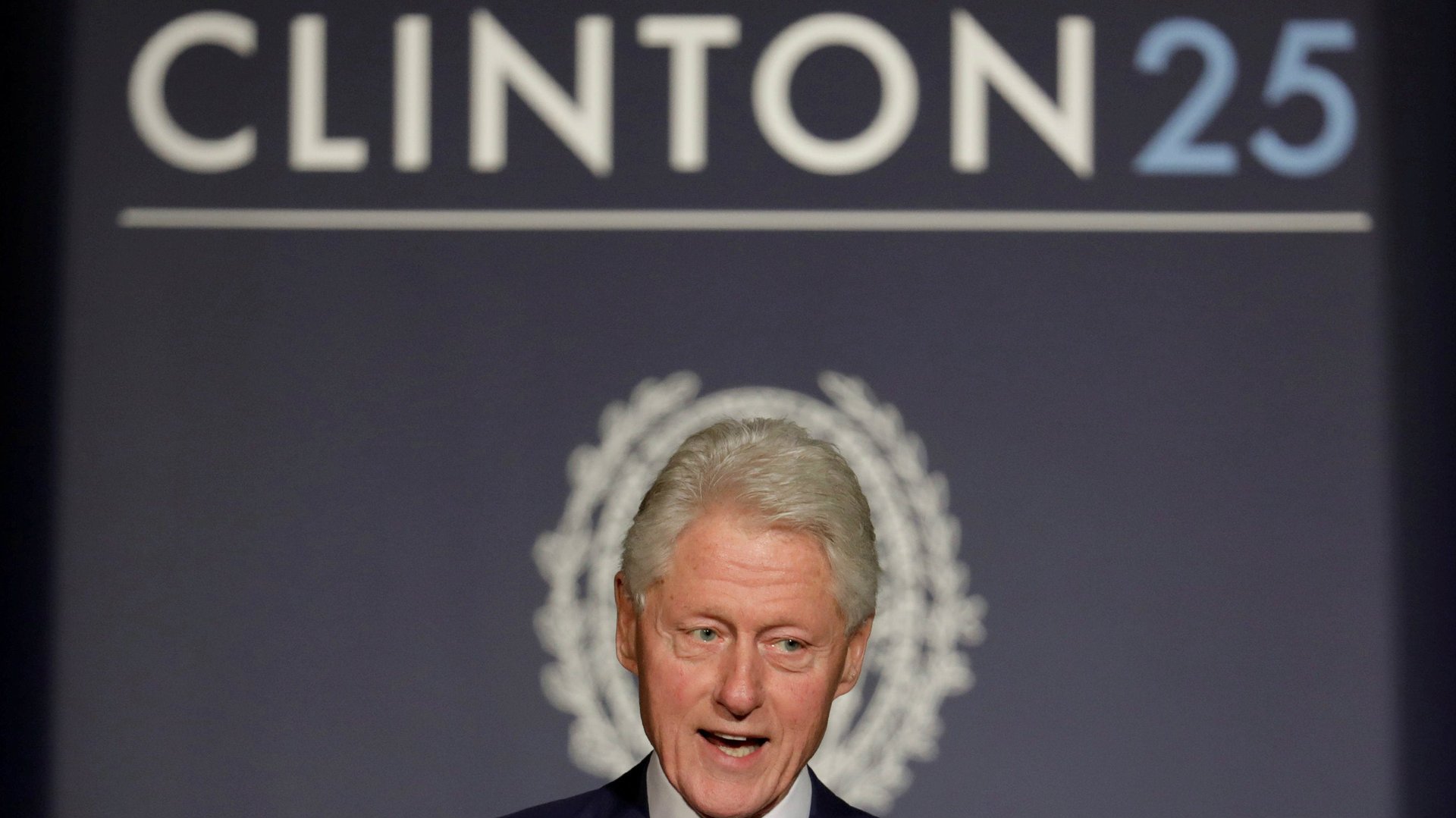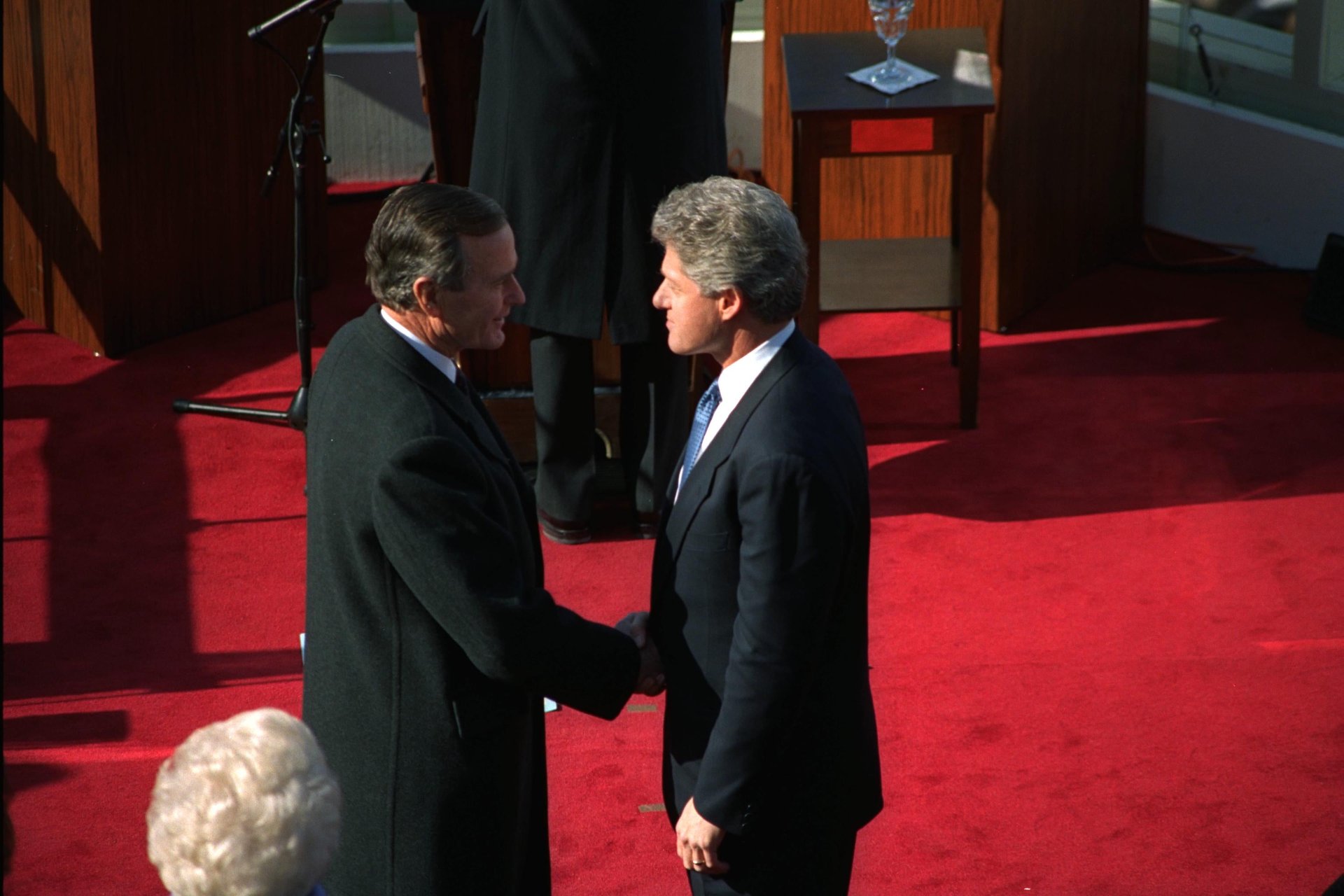Unlike most former presidents, Bill Clinton is becoming increasingly unpopular
Bill Clinton is about to mark the 25th anniversary of his inauguration as the 42nd US president. Until the night of November 8, 2016, millions of voters and experts assumed that he would be celebrating that milestone as the First Gentleman in a second Clinton administration, and that when he returned, he would be welcomed by the party and country both.


Bill Clinton is about to mark the 25th anniversary of his inauguration as the 42nd US president. Until the night of November 8, 2016, millions of voters and experts assumed that he would be celebrating that milestone as the First Gentleman in a second Clinton administration, and that when he returned, he would be welcomed by the party and country both.
On both fronts, they were wrong. Instead, Clinton’s quarter-century anniversary on January 20, 2017 is also Donald Trump’s first—and while once beloved of his country, Clinton’s star has apparently started to fall.
For years, Clinton was a popular figure both nationally and within the Democratic Party. His 2012 speech to the Democratic convention, backing Barack Obama’s reelection bid, was enthusiastically received both inside and outside the hall; Politico wrote that he “stated the case for the 44th president’s reelection in language that was crisper and more compelling than the case Obama so far has made for himself”.
But lately, Clinton’s scent seems to be turning fetid. For the first time since he left office in 2001, more Americans view Clinton unfavorably than do favorably. After peaking at 69% in 2013, Clinton’s favorability rating has slumped to 45%. This trend is unusual among retired presidents. Most can count on nostalgia to sanctify even the most benighted tenure; even the once heinously unpopular George W. Bush enjoyed favorability ratings of 59% as of late 2016.
Two major events kickstarted this unflattering reassessment. First came the 2016 presidential campaign, during which both the Democratic primary and the general election saw his legacy picked over without mercy. The Hillary Clinton-Bernie Sanders duel put Bill Clinton’s policies on welfare, financial regulation, and criminal justice reform under the microscope. Meanwhile, Donald Trump lambasted the North American Free Trade Agreement (NAFTA), signed by Clinton in 1994, as the “worst trade deal ever made”.
More recently, the #MeToo movement has prompted a reassessment of Clinton’s personal history, particularly longstanding, unresolved and unproven allegations against him of sexual harassment, sexual assault, and even rape. New York senator Kirsten Gillibrand, a onetime protégé of Hillary Clinton, recently suggested that it would have been “appropriate” for Clinton to have resigned the presidency over the Monica Lewinsky scandal.
These are the political and personal fissures that still cleave Clinton’s legacy 25 years after he took office, and they can seem impossible to close. Was he a pseudo-liberal who enacted watered-down Republicanism or the savior who brought the Democrats out of the wilderness? A roguish lothario or a sexual predator?
A different kind of president
Clinton was an anomaly from the off. His election marked a transition between generations. He was the first Baby Boomer president and the first not to have served in World War II. He was also a profoundly unlikely president.
1992 was not supposed to be a Democratic year. The incumbent Republican president, George H.W. Bush, was still surfing a wave of popularity following the first Gulf War. Better-known Democratic contenders declined to run, leaving an opening for an obscure Arkansas governor to win the party’s presidential nomination.
Clinton ran as a representative of the New Democrat movement, a faction that emerged in response to the party’s continued political misfortunes. The Democratic candidate had lost in every presidential election since 1976, and the New Democrats blamed the party’s leftward shift, which they claimed alienated Middle Americans. They sought to move the party to the center by embracing market solutions and limited government, rejecting “identity politics”, and avoiding the appearance of dovishness in foreign policy.

Clinton pursued a New Democrat agenda in the White House, out of both choice and necessity (he had to contend with a Republican-controlled Congress after the 1994 midterms). This makes his legislative legacy a curious hybrid of liberal and conservative measures.
In his first year, Clinton signed a major gun control law, mandating background checks on most firearm purchases, and pushed unsuccessfully to enact sweeping healthcare reform. He also oversaw the repeal of Glass-Steagall, the law that kept commercial and investment banking separate, and signed the Defense of Marriage Act, prohibiting the federal government from recognizing same-sex marriages.
But the Clinton presidency will always be defined by its most dramatic confrontation: the impeachment trial that resulted from the revelation that Clinton had conducted an affair with a White House intern, Monica Lewinsky. Though the conflict was ferocious, Clinton not only survived, but emerged politically strengthened. His approval ratings peaked at 73% in December 1998, at the end of the impeachment trial. Though dismissed by many at the time as an irrelevant foible, Clinton’s relationship with Lewinsky, and the abuse of power that it entailed, are being reevaluated.
If Bill Clinton faces a personal reckoning, what about “Clintonism”? A comparison between Bill Clinton’s two presidential campaigns and that of Hillary Clinton in 2016 reveals a Democratic Party that has been moving leftwards since the 1990s, on both economic and social issues. Though still centrist in tone, Hillary Clinton’s 2016 platform was—to quote none other than Bernie Sanders himself – the “most progressive platform in party history”.
At one time, it seemed Bill Clinton represented the future of center-left politics; the “Third Way” philosophy he pioneered was taken up by other leaders, most notably Tony Blair and New Labour. But now his first inauguration shares an anniversary not with his wife’s, but with Donald Trump’s—and even the party he once led seems to be turning away from his legacy.
This article was originally published on The Conversation. Read the original article.